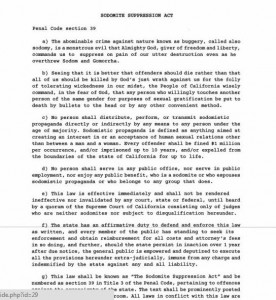 In an alarming turn of events that underscores concerns about the electoral ballot process, a California initiative has been proposed that would criminalize being lesbian, gay, bisexual, or transgender. The act called the “Sodomite Suppression Act” was submitted to the California Secretary of State by Matt McLaughlin, a lawyer in Huntington Beach. The full text of the proposed measure can be read here: https://oag.ca.gov/system/files/initiatives/pdfs/15-0008%20%28Sodomy%29.pdf
In an alarming turn of events that underscores concerns about the electoral ballot process, a California initiative has been proposed that would criminalize being lesbian, gay, bisexual, or transgender. The act called the “Sodomite Suppression Act” was submitted to the California Secretary of State by Matt McLaughlin, a lawyer in Huntington Beach. The full text of the proposed measure can be read here: https://oag.ca.gov/system/files/initiatives/pdfs/15-0008%20%28Sodomy%29.pdf
While the initiative has been met with a variety of reactions from political activists and leaders, it is clear that the proposed ballot measure is real. “This proposed ballot initiative is outrageous and offensive, and it’s grossly out of step with the attitudes and beliefs of the people of California,” said Rick Zbur, Equality California executive director. In order for the measure to reach the ballot, McLaughlin needs to get 365,880 valid signatures from California registered voters. Circulators can be paid for signatures collected and all signatures must be submitted within 180 days of approval of the measure by the Attorney General.
The proposed ballot measure underscores issues that many have with the California ballot initiative process. Established in 1911 by an amendment to the California Constitution, a ballot initiative must meet the following requirements:
- Proponent submits proposition to the state Attorney General
- AG’s office assigns title and official summary
- Proponent circulates petition to have measure placed on ballot; Senate and Assembly committee(s) may conduct public hearings during this time, but may not make changes to proposition
- Proponent files petition signatures with county elections officials to determine if the required number of valid signatures by registered voters (expressed as a percentage of voters casting ballots in the last gubernatorial race) has been collected to qualify for the ballot
- For propositions that qualify, ballot pamphlet statements (including arguments, rebuttals, and a Legislative Analyst’s Office statement on the purpose, effect, and fiscal impact of the proposition) are prepared, and joint legislative hearings are held
The next step is for signatures to be collected. The constitutionality of the initiative will be challenged in court if it passes. The ballot measure suggests that LGBT people be given the death penalty if they engage in sodomy. California does not have the death penalty because it was ruled unconstitutional. The fact that we must discuss the measure seriously highlights the need for change to the initiative process. Either the California legislature or a citizen ballot measure could make changes to the process to ensure that people’s civil rights are not violated by this electoral process. For example, the legislature could require that the California Attorney General review all proposed ballot measures through a lens of constitutionality. If a determination is made that the ballot measure would result in an unconstitutional law it could be stopped and the citizen proponent forced to litigate that the measure does meet the constitutionality test.
Under the current law, a challenge to the legality of the measure must be litigated to prevent the measure from reaching the ballot if it gets enough signatures. The LGBT community is quite familiar with ballot measures aimed at harming its community. In 1978, the Briggs Initiative tried to prevent LGBT people from teaching in California schools and was defeated under the leadership of San Francisco Supervisor Harvey Milk and others. Proposition 8 which was passed by the California electorate was passed in 2008 and prevented same sex marriage. The measure was overturned as unconstitutional by the federal court in 2010.
“It is clear that the time has come for Attorney General Kamala Harris, Assembly Speaker Toni Atkins, and California Senate President Kevin De Leon to act and address civil rights concerns with California ballot measures,” said Stampp Corbin, San Diego City Commissioner and national LGBT acivist. In a divine irony, a citizen driven ballot initiative could also address these concerns.












First, thank you for reporting on the Matthew McLaughlin story. I was really taken aback by his proposed bill. It did spur me to take a look at some of the possible “real world” implications of his bizarre proposal. Hope you enjoy them.
Here’s how lawyer Matthew McLaughlin’s initiative would actually pan out.
1. Assuming you kill 1.4 million people (approximate LGBT population of California) and congressional seats are based on population, you would lose two seats in the U.S. House of Representatives.
2. Next, consider that the median income of Californians is $61,000 and the average household size is 2.9 people. The average state income tax rate is 8%. Killing off the LGBT community would cause a loss of $40 million in tax revenue in California each year. The Fed would be out $112 million annually.
3. Finally, the average additional cost associated with a capital punishment trial is $1 million per person. Multiply that times 1.4 million LGBT and well, you do the math.
I believe not only should this “attorney” be disbarred, he should also be charged with all applicable crimes. Matthew G. McLaughlin is perhaps proposing killing more people at one time than were killed at Auschwitz during World War II.
We must accept that Mr. McLaughlin is entitled to his freedom of speech, however when an action is taken (filing of the petition) toward killing the people of the LGBT community, that action ceases to be encased in freedom and makes a transfer to criminality.
Sincerely,
Brian A. Duryea